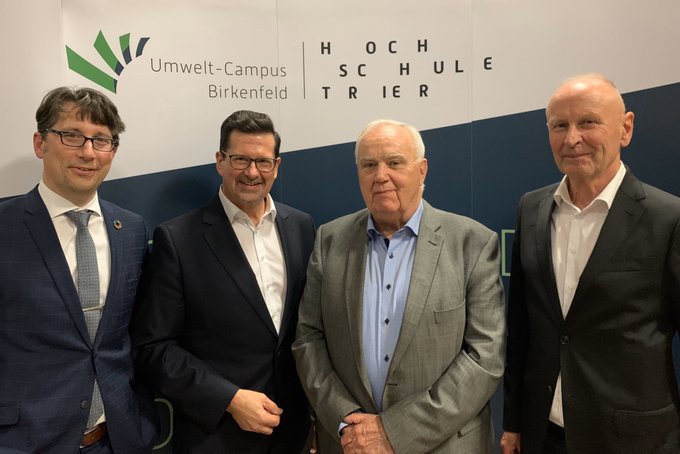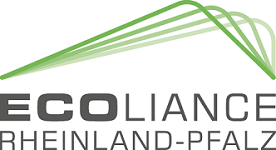Environmental technology network Ecoliance meets on the environmental campus
Board of Directors presents focal points, Advisory Board elected
Around 40 company and university representatives from the environmental technology network Ecoliance Rheinland-Pfalz e.V. took advantage of the annual circular economy conference held on the environmental campus last Wednesday for an extraordinary general meeting. The agenda included the election of a new advisory board, an amendment to the articles of association and contributions as well as information on the UmTecNetz-Potenzial-RLP research project sponsored by the Ministry of the Environment.
Prof. Dr. Dorit Schumann, the newly elected president of the University of Trier, welcomed the network representatives as host. She emphasized the very good cooperation with the network that has lasted for years and invited new cooperations between industry and research. Werner Zimmermann, chairman of the network, led through the evening and presented his efforts for sustainable building concepts with the Rhineland-Palatinate partner country Rwanda. Henrik te Heesen, board member and also professor for renewable energies at the Environmental Campus, summed up the activities of the board in recent months. The relocation of the office to the Umwelt-Campus has been completed. The homepage has been technically updated and now regularly provides up-to-date information from the GreenTech Cluster. The Executive Board now visits the members at its meetings and obtains information about the expertise and competences on site, an offer that is time-consuming but very well received. The new fee schedule now provides separate fees for start-ups and students. Ecoliance e.V. wants to win these two target groups for the network in the future and thus increase its innovative strength.
Recommendations for intensifying cooperation between universities and companies is one of the aims of the UmTecNetz-Potenzial-RLP research project, which analyses network work in Rhineland-Palatinate in form of an action research approach and points out ways for successful cross-clustering. This includes the provision and transfer of knowledge in line with member wishes, intensified cooperation with partners on questions of internationalisation, impulses for strategic personnel planning in the field of securing skilled workers or increasing innovation through digitisation.
In addition to the former Ecoliance chairman and founding member Prof. Dr. Dieter-Heinz Hellmann, Michael Hauer, managing director of the Rhineland-Palatinate Energy Agency, Heinz Flick, managing director of the German Gas and Water Association in Rhineland-Palatinate-Hesse, and Werner Theis, lawyer and former head of the water management department at the Rhineland-Palatinate Ministry of the Environment, were also able to be persuaded to elect the advisory board. In future, the Advisory Board will advise the Executive Board on scientific, technical and strategic issues, in particular water and wastewater issues.
Following the meeting, the members had the opportunity to talk to each other and interactively contribute their ideas and wishes. "The pleasant atmosphere contributes to a good exchange and further promotes our network," said Werner Zimmermann, Chairman of Ecoliance Rheinland-Pfalz e.V., summing up the evening.

